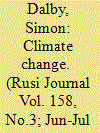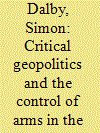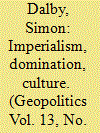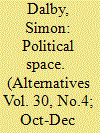|
|
|
Sort Order |
|
|
|
Items / Page
|
|
|
|
|
|
|
| Srl | Item |
| 1 |
ID:
122255


|
|
|
|
|
| Publication |
2013.
|
| Summary/Abstract |
Climate change has added new impetus and urgency to the long-running discussion of environmental security, leading to an emphasis on the overall transformation of planetary systems. In this article, Simon Dalby argues that this requires consideration of three themes in particular: urban vulnerabilities to extreme events; the unforeseen social and political consequences of adaptation and mitigation efforts; and the possibilities of geo-engineering. Furthermore, given the increasingly artificial circumstances that the global economy is creating, security planners should now focus on the consequences of further expansion of the carbon-fuelled global economy, rather than on concerns about political instabilities in the rural peripheries caused by resource conflicts.
|
|
|
|
|
|
|
|
|
|
|
|
|
|
|
|
| 2 |
ID:
104994


|
|
|
|
|
| Publication |
2011.
|
| Summary/Abstract |
Critical geopolitics is about challenging the taken for granted contextualizations of social phenomena on the large scale. Invoking insights from this burgeoning literature, this paper examines some of the key taken for granted geopolitical specifications in the discussion of arms control. In particular the case of the new Strategic Arms Reduction Treaty between the United States and Russia, and the persistent discourses of Iranian threat are formulated within some obvious, but very important geographical premises. The possibilities of innovations in the structure of the world order cannot ignore how desirable futures are rhetorically mapped, any more than they can avoid the question of who controls which arms where, in that order. Geography is never innocent, and the analysis in this paper suggests caution is appropriate when assuming the efficacy of particular contextualizations in both academic analysis and policy prescription.
|
|
|
|
|
|
|
|
|
|
|
|
|
|
|
|
| 3 |
ID:
052616


|
|
|
|
|
| Publication |
London, University of Minnesota Press, 2002.
|
| Description |
xvii, 239p.
|
| Standard Number |
0816640254
|
|
|
|
|
|
|
|
|
|
|
|
Copies: C:1/I:0,R:0,Q:0
Circulation
| Accession# | Call# | Current Location | Status | Policy | Location |
| 046511 | 341.70526/DAL 046511 | Main | On Shelf | General | |
|
|
|
|
| 4 |
ID:
155818


|
|
|
|
|
| Summary/Abstract |
Geopolitics, climate change and environmental security operate in complicated and sometimes directly conflictual ways. Driven in part by national policies of food self-sufficiency in response to economic sanctions imposed on Iran by American and European policies, the destruction of one of the world’s largest inland lakes raises questions about the interaction of multiple forms of security, and in particular how securitizations by various actors interact at a number of scales. Lake Urmia in North Western Iran has rapidly dwindled in the last decade, a result of unsustainable water extractions to irrigate growing agricultural production of apples and other horticultural products. Clearly assumptions that security is additive across sectors and scales is not the case here as elsewhere, but the Urmia Lake episode emphasizes that they are in fact frequently operating at cross-purposes; national security strategies may compromise other forms of security quite directly. Blaming climate change, and possibly the deliberate use of climate modification techniques for the lake’s demise adds a key dimension to securitization discussions. This matters for security studies more generally now because climate change is increasingly being introduced as a macrosecuritization in international politics.
|
|
|
|
|
|
|
|
|
|
|
|
|
|
|
|
| 5 |
ID:
162266


|
|
|
|
|
| Summary/Abstract |
The human control of fire is a relatively neglected part of the discussion of the contemporary transformation of the planet. Thinking about it in terms of geopolitics is a way to link climate adaptation, extinction and the possibilities of extending traditional analyses of political ecology to the global scale. Such thinking is explicitly rejected as the appropriate premises for foreign policy action by the Trump administration which poses American greatness in terms of traditional understandings of firepower. This clash of geopolitical cultures is now key to global politics, where dramatic landscape transformation, related species extinctions as well as climate change results directly and indirectly from human control of combustion. Firepower is a matter of military technology as well as, in the form of fossil fuel combustion, the essential energy source that fuels the global economy. Focusing on combustion as a key geophysical force in contemporary geopolitics offers useful insights into the Anthropocene discussion and, in particular, the two planetary boundaries of climate change and biodiversity loss, which are key to contemporary efforts at global environmental governance.
|
|
|
|
|
|
|
|
|
|
|
|
|
|
|
|
| 6 |
ID:
086409


|
|
|
|
|
| Publication |
2009.
|
| Summary/Abstract |
In the aftermath of September 11, 2001 American geopolitical categories changed as the world was remapped into categories congruent with the prosecution of the global war on terror. The designation global was linked to the capabilities of the new military technologies of the revolution in military affairs in official documents that codified the Bush doctrine. The official US doctrine now explicitly states that ending tyranny on earth is the national security objective for which these new forces will be used. But a careful reading of the official 2006 Quadrennial Defense Review Report, and Thomas Barnett's popular exposition of the logic of the war on terror in The Pentagon's New Map shows that both these geographical specification of contemporary geopolitics, and the high-technology forces planned to fight the war, offer little promise that it will be successfully prosecuted. Geopolitics remains much more complicated than either contemporary policy statements or popular cartographic justifications suggest.
|
|
|
|
|
|
|
|
|
|
|
|
|
|
|
|
| 7 |
ID:
084633


|
|
|
|
|
| Publication |
2008.
|
| Summary/Abstract |
Twenty years ago Gear id Tuathail called for an approach within Political Geography that made geopolitical culture and the formulation of foreign policy the object of analysis. He specified the task of what subsequently became critical geopolitics as the need to expose the complicity of geopolitics with domination and imperialism. After the cold war there was a decade when military matters declined in importance and globalisation confused the geographical designations of danger. In the aftermath of 9/11 the utility of force has been reasserted by a neo-Reaganite American foreign policy using military force in the global war on terror and the invasion of Iraq. Now the geopolitical culture is a matter of debates about empire and the appropriate geopolitical designation of danger, whether in Thomas Barnett's non integrated gap on "the Pentagon's New Map" or in the complex geographies of Alain Joxe's "Empire of Disorder". This re-militarisation of global politics clearly suggests the continued relevance of Tuathail's specification of the need for critical geopolitics to grapple with the culture that produces imperial attempts at domination in distant places.
|
|
|
|
|
|
|
|
|
|
|
|
|
|
|
|
| 8 |
ID:
067820


|
|
|
| 9 |
ID:
080467


|
|
|
|
|
| Publication |
2007.
|
| Summary/Abstract |
The often overlooked economic dimensions of the current American national security strategy bridge the military policies of the neo-conservative Bush doctrine with the neo-liberal tendencies of economic globalisation. They do so by explicitly extending control into the "dangerous periphery" of the global economy by strategies that attempt to integrate these regions into the global economy. Reading recent official American defence documents in parallel with commentaries on the war on terror by popular authors Thomas Barnett and Robert Kaplan suggests a broad complementarity of geopolitical categories that link imperial military action directly with neo-liberal globalisation. Both rely on a dichotomous mapping of the world into civilised core and dangerous periphery, categories that reprise earlier imperial mappings of the world and replicate the violent practices of empire
|
|
|
|
|
|
|
|
|
|
|
|
|
|
|
|
| 10 |
ID:
001586


|
|
|
|
|
| Publication |
London, Routledge, 1998.
|
| Description |
xx, 333p.
|
| Standard Number |
0415172500
|
|
|
|
|
|
|
|
|
|
|
|
Copies: C:1/I:0,R:0,Q:0
Circulation
| Accession# | Call# | Current Location | Status | Policy | Location |
| 041202 | 320.12/TUA 041202 | Main | On Shelf | General | |
|
|
|
|
|
|
|
|
|